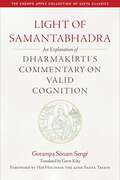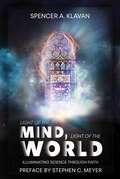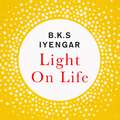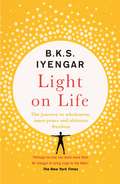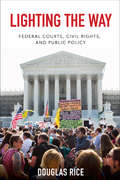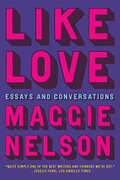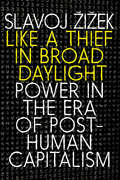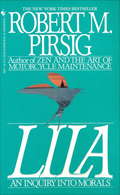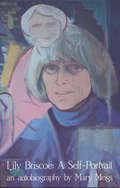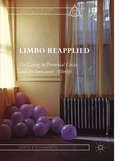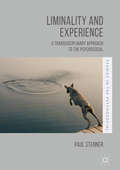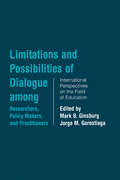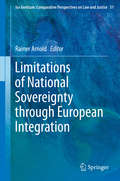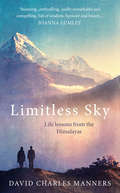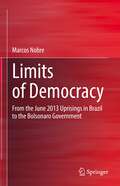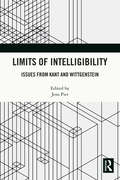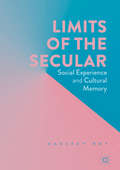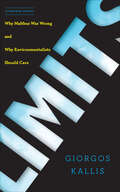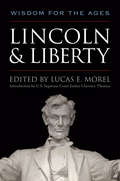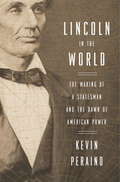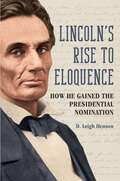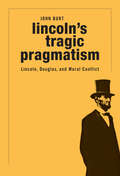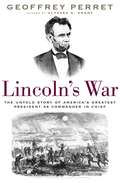- Table View
- List View
Light of Samantabhadra: An Explanation of Dharmakirti's Commentary on Valid Cognition
by Gorampa Sönam SengéAn illuminating gateway to Indian philosophy and its explication in Tibet.Among the many works produced in the rich philosophical tradition of India&’s classical age, few have had more impact than Dharmakirti&’s Commentary on Valid Cognition (Pramanavarttika). Composed in India in the seventh century, it became the cornerstone for the study of logic and epistemology in the Tibetan Buddhist tradition. An important addition to any collection for the Sakya practitioner, Light of Samantabhadra translates the work of one of the premier scholars of the Sakya school, Gorampa Sonam Sengé (1429–89). Gorampa here illuminates the first two chapters of Dharmakirti&’s treatise, those on using inference to enlighten oneself (svarthanumana) and on establishing valid cognition (pramanasiddhi), both to determine the authority of the Buddha as a valid teacher and to eliminate the cognitive obstacles to awakening. The root text is composed in compact verses, and these are translated here along with Gorampa&’s word-by-word commentary that reveals their often-veiled meanings. These chapters explore key issues in the philosophy of language and the nature of conventional designation, the way to employ sound reasoning, the proof of past and future lives, and the way to eliminate the view of self. In the skilled hands of translator Gavin Kilty, these insights are made accessible to contemporary readers.
Light of the Mind, Light of the World: Illuminating Science Through Faith
by Spencer KlavanThe world is not a machine. Humanity is not a mistake. For centuries, a grim anti-human outlook has taken hold of the public imagination, teaching us all to view ourselves as random products of a cruel and uncaring natural world. Today, from apocalyptic environmentalism to twisted eugenics and dystopian bionic augmentation, movements are rising around the world to dispense with humanity or subordinate it to a pitiless mechanical logic. For many, it has come to seem as if the human spirit is obsolete, religious faith is illusory, and mankind is destined to be extinguished or surpassed. Some might even see the end of humanity as a good thing. But that is not our future. Light of the Mind, Light of the World tells a daring new story about how we got here, and how we can chart a better path forward. Surveying the history of science and faith from the astronomers of Babylon to the quantum physicists of postwar Europe and America, classicist and scholar Spencer A. Klavan argues that science itself is leading us not away from God but back to him, and to the ancient faith that places the human soul at the center of the universe. Reconciling the discoveries of science with the truths of the Bible, Klavan shows how the search for knowledge of the natural world can help illuminate the glories of its Creator, and how the latest developments in physics can help shatter the illusion of materialism.
Light on Life: The Yoga Journey to Wholeness, Inner Peace and Ultimate Freedom
by B.K.S. IyengarA must-have for anyone who practises yoga or is interested in the teachings of the East.B.K.S. Iyengar, whose teachings on yoga are followed throughout the world, reflects upon his lifetime's experience on the yoga path. The structure of the book follows the different aspects of that path (from Freedom Awaits, through The Physical Body, The Energy Body, The Mental Body, The Intellectual Body, The Divine Body to Living in Freedom) and provides a learning framework for yoga as well as an invaluable discourse on life. 'Iyengar knows what the body needs, and he's introduced to the West the Easterner's best path to health and well-being' - TIME Magazine'Revelations from a lifetime of studying yoga' - The Washington Post 'Light on Life is rich in yoga philosophy and methodology. But unlike his previous writings, this new book is full of autobiographical anecdotes' - The New York Times 'Mr Iyengar reveals in Light on Life the 'heart of yoga' that he personally discovered through more than 70 years of disciplined, daily practice ... [including] the precise ways that yoga can transform our lives and help us live in harmony with the world around us' - Yoga Journal(P) 2019 Hodder & Stoughton Ltd
Light on Life: The Yoga Journey to Wholeness, Inner Peace and Ultimate Freedom (Iyengar Yoga Bks.)
by B.K.S. IyengarA must-have for anyone who practises yoga or is interested in the teachings of the East.B.K.S. Iyengar, whose teachings on yoga are followed throughout the world, reflects upon his lifetime's experience on the yoga path. The structure of the book follows the different aspects of that path (from Freedom Awaits, through The Physical Body, The Energy Body, The Mental Body, The Intellectual Body, The Divine Body to Living in Freedom) and provides a learning framework for yoga as well as an invaluable discourse on life.'Iyengar knows what the body needs, and he's introduced to the West the Easterner's best path to health and well-being' - TIME Magazine'Revelations from a lifetime of studying yoga' - The Washington Post 'Light on Life is rich in yoga philosophy and methodology. But unlike his previous writings, this new book is full of autobiographical anecdotes' - The New York Times 'Mr Iyengar reveals in Light on Life the 'heart of yoga' that he personally discovered through more than 70 years of disciplined, daily practice ... [including] the precise ways that yoga can transform our lives and help us live in harmony with the world around us' - Yoga Journal'The Michelangelo of yoga' - BBC TV
Lighting the Way: Federal Courts, Civil Rights, and Public Policy (Constitutionalism and Democracy)
by Douglas RiceDo our federal courts, including the Supreme Court, lead or merely implement public policy? This is a critical question in the study and practice of law, with a long history of continued dispute and contradictory evidence. In Lighting the Way, Douglas Rice systematically examines both sides of this debate. Introducing compelling new data on the policy focuses of federal courts, Rice presents the first long-term, comprehensive consideration of the judicial agenda. In doing so, he details the essential role of the Supreme Court and other federal courts in directing attention to issues in American politics through influential relationships with Congress, the presidency, and the public. The dynamics Rice illustrates grow from the strengths of political constituencies in various policy areas and the constitutional powers accorded to the courts. Lighting the Way provides strong evidence that, as long argued but never empirically demonstrated, the courts systematically lead the attention of other institutions on civil rights. The research speaks to a broad and growing literature in political science and sociolegal research on the interactive nature of policymaking and the critical role of legal institutions and social movements in shaping policy agendas.
Like Love: Essays And Conversations
by Maggie NelsonOne of the Globe and Mail's most anticipated books of 2024A career-spanning collection of inspiring, revelrous essays about art and artists.Like Love is a momentous, raucous collection of essays drawn from twenty years of Maggie Nelson&’s brilliant work. These profiles, reviews, remembrances, tributes, and critical essays, as well as several conversations with friends and idols, bring to life Nelson&’s passion for dialogue and dissent. The range of subjects is wide—from Prince to Carolee Schneemann to Matthew Barney to Lhasa de Sela to Kara Walker—but certain themes recur: intergenerational exchange; love and friendship; feminist and queer issues, especially as they shift over time; subversion, transgression, and perversity; the roles of the critic and of language in relation to visual and performance arts; forces that feed or impede certain bodies and creators; and the fruits and follies of a life spent devoted to making.Arranged chronologically, Like Love shows the writing, thinking, feeling, reading, looking, and conversing that occupied Nelson while writing iconic books such as Bluets and The Argonauts. As such, it is a portrait of a time, an anarchic party rich with wild guests, a window into Nelson&’s own development, and a testament to the profound sustenance offered by art and artists.
Like a Thief in Broad Daylight: Power in the Era of Post-Human Capitalism
by Slavoj ZizekThe latest book from "the most despicable philosopher in the West" (New Republic) considers the new dangers and radical possibilities set in motion by advances in Big Tech.In recent years, techno-scientific progress has started to utterly transform our world--changing it almost beyond recognition. In this extraordinary new book, renowned philosopher Slavoj Žižek turns to look at the brave new world of Big Tech, revealing how, with each new wave of innovation, we find ourselves moving closer and closer to a bizarrely literal realization of Marx's prediction that "all that is solid melts into air." With the automation of work, the virtualization of money, the dissipation of class communities, and the rise of immaterial, intellectual labor, the global capitalist edifice is beginning to crumble, more quickly than ever before--and it is now on the verge of vanishing entirely.But what will come next? Against a backdrop of constant socio-technological upheaval, how could any kind of authentic change take place? In such a context, Žižek argues, there can be no great social triumph--because lasting revolution has already come into the scene, like a thief in broad daylight, stealing into sight right before our very eyes. What we must do now is wake up and see it. Urgent as ever, Like a Thief in Broad Daylight illuminates the new dangers as well as the radical possibilities thrown up by today's technological and scientific advances, and their electrifying implications for us all.
Lila
by Robert PirsigThe author of Zen and the Art of Motorcycle Maintenance examines life's essential issues as he recounts the journey down the Hudson River in a sailboat of his philosopher-narrator Phaedrus.
Lila
by Robert PirsigThe author of Zen and the Art of Motorcycle Maintenance examines life's essential issues as he recounts the journey down the Hudson River in a sailboat of his philosopher-narrator Phaedrus.
Lily Briscoe
by Mary MeigsTaking as her alter-ego Lily Briscoe - the painter in Woolf's To the Lighthouse - Mary Meigs portrays herself, her family, and her friends in Lily Briscoe: A Self-Portrait, a book that is both autobiography and memoir. She describes the three major decisions of her life: "not to marry, to be an artist," and to listen to her "own voices."
Limbo Reapplied: On Living in Perennial Crisis and the Immanent Afterlife (Radical Theologies and Philosophies)
by Kristof K.P. VanhoutteThe observation that our world is signed by a lasting crisis is as much underwritten as it is questioned. This book offers a new and provocative thesis by taking recourse to the religious discourse of Limbo, and by investigating the temporal and spatial structures of crisis and modernity. Modernity reveals itself to be the state of perennial crisis, and we all live in an immanentized state of Limbo.
Liminality and Experience
by Paul StennerThis book breathes new life into the study of liminal experiences of transition and transformation, or ‘becoming’. It brings fresh insight into affect and emotion, dream and imagination, and fabulation and symbolism by tracing their relation to experiences of liminality. The author proposes a distinctive theory of the relationship between psychology and the social sciences with much to share with the arts. Its premise is that psychosocial existence is not made of ‘stuff’ like building blocks, but of happenings and events in which the many elements that compose our lives are temporarily drawn together. The social is not a thing but a flow of processes, and our personal subjectivity is part of that flow, ‘selves’ being tightly interwoven with ‘others’. But there are breaks and ruptures in the flow, and during these liminal occasions our experience unravels and is rewoven. This book puts such moments at the core of the psychosocial research agenda. Of transdisciplinary scope, it will appeal beyond psychosocial studies and social psychology to all scholars interested in the interface between experience and social (dis)order.
Limitations and Possibilities of Dialogue among Researchers, Policymakers, and Practitioners: International Perspectives on the Field of Education (Studies in Education/Politics)
by Mark B. Ginsburg Jorge M. GorostiagaThe chapters in this edited volume raise important issues of the relation between research and its various external "publics".
Limitations of National Sovereignty through European Integration
by Rainer ArnoldThe book considers the changes which national sovereignty has undergone through the supranational European integration. In various contributions by renowned academics and high judges demonstrate the serious impacts of supranationality on the EU member states and even on third countries which are connected with the EU by international treaties. It becomes clear that primacy of EU law, the most significant expression of supra-nationality, collides with national sovereignty as anchored in the national constitutions. The studies clearly show that most member states do not fully deny EU law primacy but are aware of the need to find an adequate balance between the supranational and the national orders. The result from the analyses of the authors from various European countries is that the upcoming constitutional paradigm is "constitutional identity", a concept established by jurisprudence in Germany, France, Czech Republic (without being named so) and debated also in Poland which, herself, denies supranational impact on the national Constitution entirely. Studies on selected EU member states clarify the specific national approaches towards the limitations of their sovereignty as developed by the constitutional jurisprudence (Poland, Czech Republic, Hungary, Romania, Italy, Germany with comparative references to United Kingdom and France). It is illuminated that traditionally strong sovereignty concepts (UK, France) are considerably relativized and functionally opened towards the integration challenges. Basic issues are furthermore reflected, such as the supranational impact on the State's power to reform its Constitution, the relation of national and constitutional identity and the national and supranational perspectives of identity. The book also includes Europe beyond the EU by research on the supranational character of association treaties (from a Ukrainian perspective) and on the Europeanization of a third country preparing EU membership (Albania).
Limitless Sky: Life lessons from the Himalayas
by David Charles MannersThis is the remarkable true story of a young man's initiation in the Himalayas. David Manners was trekking in Nepal when he stumbled upon the mountain home of a jhankri, or Nepalese shaman. The jhankri accepted David as his pupil, and so began the next stage of David's extraordinary journey, in which he embarked upon an adventure that was more challenging and, ultimately, life-affirming than anything he could have imagined. In Limitless Sky, David shares the wisdom and insights he learnt from those transformational days in the Himalayas. These include practical guidance on how to live a full and fearless life, how to find happiness and how to live in ways that nurture both ourselves and others. As David reveals, the life lessons he learned amongst the mountains of the Himalayas could benefit us all today.
Limits of Democracy: From the June 2013 Uprisings in Brazil to the Bolsonaro Government
by Marcos NobreIn this timely book, Brazilian political philosopher Marcos Nobre analyzes the social and political roots of the election of Jair Bolsonaro to the presidency of Brazil and shows how this process is connected to the rise of new far-right movements threatening democracy around the world. Nobre describes the rise of the movement that elected Bolsonaro as a reactionary and anti-democratic highjack of the democratic impulse unleashed by the June 2013 uprisings, when millions of Brazilians took to the streets to protest against a dysfunctional political system, and frames the Brazilian case within the global crisis that exposed the limits of a democracy based on the neoliberal consensus after the 2008 financial crisis. According to Nobre, the June 2013 uprisings in Brazil was part of the global cycle of popular protests that swept many countries between 2011 and 2013, reclaiming a new model of democracy which could go beyond bureaucratic and technocratic parties and cabinets. However, in Brazil, as in many other places, this initial democratic impulse was captured by new far-right movements which are now posing serious threats to democracy. This book intends to collaborate in a change of attitude, both theoretical and practical, that may help finding ways of fighting the authoritarian threat to democracy as well as of deepening democracy as a life form. The decline of neoliberalism not only did not produce any effectively progressive realist alternative, but also opened the way for a dispute over models of society in which democracy itself has ceased to represent the primary reference in disputes over the best way to regulate life in society. Democracy is no longer self-evident, it is in danger. And the only way to save it is by inventing new democratic practices to overcome the limits imposed by institutional political systems no longer capable of channeling the real struggles in the societies they claim to represent.
Limits of Intelligibility: Issues from Kant and Wittgenstein
by Jens PierThe essays in this volume investigate the question of where, and in what sense, the bounds of intelligible thought, knowledge, and speech are to be drawn. Is there a way in which we are limited in what we think, know, and say? And if so, does this mean that we are constrained – that there is something beyond the ken of human intelligibility of which we fall short? Or is there another way to think about these limits of intelligibility—namely as conditions of our meaning and knowing anything, beyond which there is no specifiable thing we cannot do? These issues feature prominently in the writings of Kant and Wittgenstein who each engaged with them in unique and striking ways. Their thoughts on the matter remain provocative and stimulating, and accordingly the contributions to this volume address the issues surrounding the limits of intelligibility both exegetically and systematically: they examine how they figure in Kant’s and Wittgenstein’s most significant works and put them in touch with contemporary debates that are shaped by their legacy. These debates concern, inter alia, logically and morally alien thought, the semantics and philosophy of negation, disjunctivism in philosophy of perception and ethics, paraconsistent approaches to contradiction, and the relation between art, literature, and philosophy. The book is divided into four parts: Part I gives a first assessment of the issues, Part II examines limits as they feature in Kant, Part III as they feature in Wittgenstein, and Part IV suggests some ways in which the questions might be reconsidered, drawing upon ideas in phenomenology, dialetheism, metamathematics, and the works of other influential authors. Limits of Intelligibility provides insight into a theme that is central to the thought of two of the most important figures in modern philosophy, as well as to recent metaphysics, philosophy of language, philosophy of logic, epistemology, and ethics.
Limits of the Secular
by Kaustuv RoyThis book facilitates a missing dialogue between the secular and the transsecular dimensions of human existence. It explores two kinds of limits of the secular: the inadequacies of its assumptions with respect to the total being of the human, and how it curbs the ontological sensibilities of the human. Kaustuv Roy argues that since secular reason of modernity can only represent the empirical dimension of existence, humans are forced to privatize the non-empirical dimension of being. It is therefore absent from the social, imaginary, as well as public discourse. This one-sidedness is the root cause of many of the ills facing modernity. Roy contends that a bridge-consciousness that praxeologically relates the secular and the non-secular domains of experience is the need of the hour.
Limits: Why Malthus Was Wrong and Why Environmentalists Should Care (Stanford Briefs)
by Giorgos KallisWestern culture is infatuated with the dream of going beyond, even as it is increasingly haunted by the specter of apocalypse: drought, famine, nuclear winter. How did we come to think of the planet and its limits as we do? This book reclaims, redefines, and makes an impassioned plea for limits—a notion central to environmentalism—clearing them from their association with Malthusianism and the ideology and politics that go along with it. Giorgos Kallis rereads reverend-economist Thomas Robert Malthus and his legacy, separating limits and scarcity, two notions that have long been conflated in both environmental and economic thought. Limits are not something out there, a property of nature to be deciphered by scientists, but a choice that confronts us, one that, paradoxically, is part and parcel of the pursuit of freedom. Taking us from ancient Greece to Malthus, from hunter-gatherers to the Romantics, from anarchist feminists to 1970s radical environmentalists, Limits shows us how an institutionalized culture of sharing can make possible the collective self-limitation we so urgently need.
Lincoln & Liberty: Wisdom for the Ages
by Lucas E. MorelEssays exploring the sixteenth president&’s political philosophy. Generations of Americans have studied Abraham Lincoln&’s life, presidency, and leadership, often remaking him into a figure suited to the needs and interests of their own time. This illuminating volume takes a different approach to his political thought and practice. Here, a distinguished group of contributors argue that Lincoln&’s relevance today is best expressed by rendering an accurate portrait of him in his own era. They seek to understand Lincoln as he understood himself and as he attempted to make his ideas clear to his contemporaries. What emerges is a portrait of a prudent leader who is driven to return the country to its original principles in order to conserve it. The contributors demonstrate that, far from advocating an expansion of government beyond its constitutional limits, Lincoln defended both the Declaration of Independence and the Constitution. In his introduction, Justice Clarence Thomas discusses how Lincoln used the ideological and structural underpinnings of those founding documents to defeat slavery and secure the liberties that the Republic was established to protect. Other chapters reveal how Lincoln upheld the principle of limited government even as he employed unprecedented war powers. Featuring contributions from leading scholars such as Michael Burlingame, Allen C. Guelzo, Fred Kaplan, and Matthew Pinsker, this innovative collection presents fresh perspectives on Lincoln both as a political thinker and a practical politician. Taken together, these essays decisively demonstrate that the most iconic American president still has much to teach the modern-day student of politics.
Lincoln in the World
by Kevin PerainoA captivating look at how Abraham Lincoln evolved into one of our seminal foreign-policy presidents--and helped point the way to America's rise to world power. This is the story of one of the most breathtaking feats in the annals of American foreign policy--performed by one of the most unlikely figures. Abraham Lincoln is not often remembered as a great foreign-policy president. He had never traveled overseas and spoke no foreign languages. And yet, during the Civil War, Lincoln and his team skillfully managed to stare down the Continent's great powers--deftly avoiding European intervention on the side of the Confederacy. In the process, the United States emerged as a world power in its own right. Engaging, insightful, and highly original, Lincoln in the World is a tale set at the intersection of personal character and national power. The narrative focuses tightly on five distinct, intensely human conflicts that helped define Lincoln's approach to foreign affairs--from his debate, as a young congressman, with his law partner over the conduct of the Mexican War, to his deadlock with Napoleon III over the French occupation of Mexico. Bursting with colorful characters like Lincoln's bowie-knife-wielding minister to Russia, Cassius Marcellus Clay; the cunning French empress, Eugénie; and the hapless Mexican monarch Maximilian--Lincoln in the World draws a finely wrought portrait of a president and his team at the dawn of American power. In the Age of Lincoln, we see shadows of our own world. The international arena in the 1860s could be a merciless moral vacuum. Lincoln's times demanded the cold, realistic pursuit of national interest, and, in important ways, resembled our own increasingly multipolar world. And yet, like ours, Lincoln's era was also an information age, a period of rapid globalization. Steamships, telegraph wires, and proliferating new media were transforming the world. Global influence required the use of "soft power" as well as hard. Anchored by meticulous research into overlooked archives, Lincoln in the World reveals the sixteenth president to be one of America's indispensable diplomats--and a key architect of America's emergence as a global superpower. Much has been written about how Lincoln saved the Union, but Lincoln in the World highlights the lesser-known--yet equally vital--role he played on the world stage during those tumultuous years of war and division.
Lincoln's Political Thought
by George KatebAt the center of Lincoln's political thought and career is an intense passion for equality that runs so deep in the speeches, messages, and letters that it has the force of religious conviction for Lincoln. George Kateb examines these writings to reveal that this passion explains Lincoln's reverence for both the Constitution and the Union.
Lincoln's Rise to Eloquence: How He Gained the Presidential Nomination
by D. Leigh HensonAt turns eloquent and earthy, Abraham Lincoln’s rhetoric played a vital role in his success as a politician and statesman. D. Leigh Henson examines Lincoln’s pre-presidential development as a rhetorician, the purposes and methods behind his speeches and writings, and how the works contributed to his political rise. Lincoln’s close study of the rhetorical process drew on sources that ranged from classical writings to foundational American documents to the speeches of Daniel Webster. As Henson shows, Lincoln applied his learning to combine arguments on historical, legal, and moral grounds with appeals to emotion and his own carefully curated credibility. Henson also explores Lincoln’s use of the elements of structural design to craft coherent arguments that, whatever their varying purposes, used direct and plain language to reach diverse audiences--and laid the groundwork for his rise to the White House. Insightful and revealing, Lincoln’s Rise to Eloquence follows Lincoln from his early career through the years-long clashes with Stephen A. Douglas to trace the future president’s evolution as a communicator and politician.
Lincoln's Tragic Pragmatism: Lincoln, Douglas, and Moral Conflict
by John BurtA New York Times Book Review Editors’ ChoiceIn 1858, challenger Abraham Lincoln debated incumbent Stephen Douglas seven times in the race for a U.S. Senate seat from Illinois. More was at stake than slavery in those debates. In Lincoln’s Tragic Pragmatism, John Burt contends that the very legitimacy of democratic governance was on the line. In a United States stubbornly divided over ethical issues, the overarching question posed by the Lincoln-Douglas debates has not lost its urgency: Can a liberal political system be used to mediate moral disputes? And if it cannot, is violence inevitable?“John Burt has written a work that every serious student of Lincoln will have to read...Burt refracts Lincoln through the philosophy of Kant, Rawls and contemporary liberal political theory. His is very much a Lincoln for our time.”—Steven B. Smith, New York Times Book Review“I'm making space on my overstuffed shelves for Lincoln’s Tragic Pragmatism. This is a book I expect to be picking up and thumbing through for years to come.”—Jim Cullen, History News Network“Burt treats the [Lincoln-Douglas] debates as being far more significant than an election contest between two candidates. The debates represent profound statements of political philosophy and speak to the continuing challenges the U.S. faces in resolving divisive moral conflicts.”—E. C. Sands, Choice
Lincoln's War: The Untold Story of America's Greatest President as Commander-In-Chief
by Geoffrey PerretThis is a readable and yet scholarly work which serves as both history and biography. "Incredible as it may seem to us, when Lincoln became president, there was still a question as to whether the president, even acting as commander in chief, had the power to determine military policy. It fell to Lincoln to create the role of commander in chief. This book tells how he did that and how, in so doing, he created the modern presidency."
